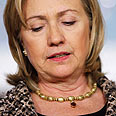
Clinton: Egypt must transition to democracy
While US secretary of state expects protests in Egypt to lead to 'real democracy that won't turn into military dictatorship in six months,' Arab League chief Moussa hopes multi-party system is in near future
The US expects that the protests in Egypt will lead to free and fair elections as part of an "orderly" transition to "real democracy," Secretary of State Hillary Rodham Clinton said Sunday as the Obama administration worked to get a handle on the fast-moving upheaval shaking the American ally.
"I want the Egyptian people to have a chance to chart a new future," said Clinton, who addressed the volatile situation in back-to-back interviews on the five morning TV news shows before leaving on a trip to Haiti.
Asked if she thought longtime Egyptian President Hosni Mubarak had taken the necessary steps so far to hold on, Clinton said, "It's not a question of who retains power. ... It's how are we going to respond to the legitimate needs and grievances expressed by the Egyptian people and chart a new path. Clearly, the path that has been followed has not been one that has created that democratic future, that economic opportunity that people in the peaceful protests are seeking."
Mubarak appointed a vice president on Saturday for the first time in more than 30 years - the US long has pressed for that and Clinton called it the "bare beginning of what needs to happen" - and has pledged to make reforms.
"We want to see free and fair elections and we expect that this will be one of the outcomes of what is going on" now, Clinton said.
She spoke of the need for "an orderly, peaceful transition to real democracy, not faux democracy, like the elections we saw in Iran two years ago."
"Real democracy," she said, doesn't mean one that lasts for six months before "evolving into essentially a military dictatorship."
Efforts by Mubarak to respond to the needs of the Egyptian people and move toward democracy are "in the best interest of everyone, including the current government," Clinton said.
"We are totally committed to working with the Egyptians that are interested in a true democracy," she said.
The State Department said Sunday that US citizens in Egypt should consider leaving the country as soon as they can because of the spreading unrest.
Clinton appeared on "Fox News Sunday," NBC's "Meet the Press," CBS' "Face the Nation," CNN's "State of the Union" and ABC's "This Week."
'New gov't doesn't necessarily mean change'
Also Sunday, Amr Moussa, the head of the Arab League, said he wanted to see a multi-party democracy emerge in Egypt but could not say how soon that might happen.
Speaking to BBC radio, the former Egyptian foreign minister also said that President Hosni Mubarak needed to respond to mass protests demanding reform, rather than reshuffling ministers.
"This new government should be just the beginning, just a new prime minister and new ministers does not necessarily mean a change, clear lines of policy will have to be declared," he told the BBC's The World This Weekend program.
Asked if he thought Mubarak might quit, Moussa said: "I don't think he is that type," but he added that he thought Mubarak was listening carefully to calls for reform.
Moussa noted he did not see himself as a president of Egypt.
"I am not a candidate (for president), the constitution does not allow me to run," he said.
However, he did not rule out playing a role if Egypt did move towards a multi-party system.
"I hope that we would reach that point (of) a multi-party system and that democracy is in full train, it offers different opportunities, creates different opportunities," he said. "I hope it will be sooner than we think."
Moussa said Arab countries had to respond to the calls for change which started in Tunisia and had swept across the region.
"The Arab world now is on the path of change. This is the motto now, reform, change, modernization," he said. "All of us should be concerned that the situation in our societies is indeed very shaky and full of complaints and uncomfortable feelings."
AP, Reuters contributed to the report
- Follow Ynetnews on Facebook










